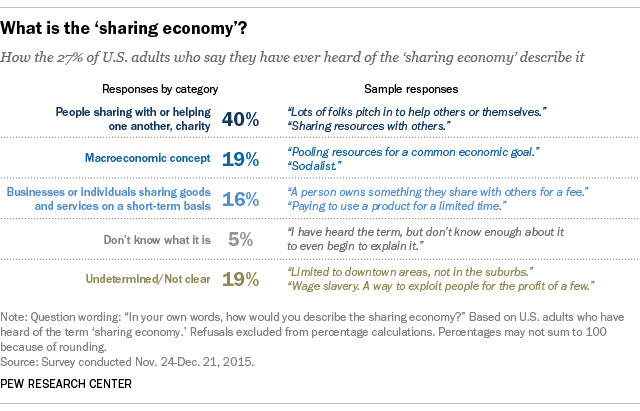In this post Sophie Paterson of Lowimpact.org explores the power of sharing in a growing movement including The Library of Things, Streetbank, Share Shops and more.
With January sales already in full swing, many of us might be feeling adrift in the sea of consumerism that the season of goodwill has become. No better time, then, to attempt to restore our faith in humanity by considering the antidote to shopping: sharing. Critical to human evolution according to evidence uncovered from studies of the Blombos Cave in South Africa, sharing as a concept is by no means new. In more recent times in Western capitalist societies, however, the practice of sharing has become buried in favour of individually stockpiling the newest, shiniest goods to hit the shelves, which in many cases may hardly ever actually be used. But what happens when we say no to constant consumption, no to owning everything we might possibly need?
Defining sharing
So what exactly do we mean by sharing today? This is an important question to tackle from the off and it is perhaps best to begin by considering what sharing is not. Top of the list here is the so-called ‘sharing economy’, which, since its adoption by the likes of Uber and Airbnb, has become rather murky territory, for reasons explained in this post from Dave Darby in 2015. Since then, little appears to have changed. With locals increasingly priced out of tourist hot-spots such as Barcelona, increased gentrification and fears about the decline of small family-run hotels linked to the rise of Airbnb and mounting criticism of Uber making regular media headlines throughout 2017, these prime examples of platform capitalism remain far from embodying the true concept of sharing, in spite of their loud proclamations of corporate social responsibility.

Confused by the so-called sharing economy? You’re not alone, according to PEW Research Centre.
Then there is the whole host of other terms which sprouted up alongside the ‘sharing economy’. Pioneer of one such term is Rachel Botsman, author of What’s Mine is Yours: How Collaborative Consumption is Changing the Way We Live. She seeks to define and delineate this and various other terms here. What becomes clear is that each of the platforms discussed – whether craft giant Etsy, Inc or Kickstarter, re-launched as a Benefit Corporation in 2015 – whilst involved in interesting and laudable work at first glance is operating on a very much for-profit basis, beholden to share-holders. Not a form of sharing that ultimately benefits many of us, then.
Surely sharing in its truest sense is the act of lending, borrowing or giving something for free. So, with the ‘sharing economy’ and ‘collaborative consumption’ of platform capitalism ruled out, let’s explore what more genuine forms of sharing in action look like.
From low-cost…
First up, it’s the turn of the Share Shop movement, a concept born in Berlin in 2012 and first piloted in the UK in West Norwood, London, as The Library of Things in 2014. Central to its creation is a questioning of the assumption that a single household should own everything it needs, particularly when those things might be used on only a fairly occasional basis. Think power tools, projectors, pressure washers. Fast forward one year and in Frome, Somerset, eight 18-30-year-olds were given an empty shop, £500 and the challenge to create the UK’s very first Share Shop in a mere 6 weeks. The video below explains what SHARE is and how it works.
Since then, it has gone from strength to strength, and currently boasts over 800 members who between them can borrow a diverse inventory of 787 items to date, from power drills and leaf-blowers to preserving pans and camping equipment. Such is its success that spin-offs now exist in various locations across England: Share Shed opened its doors to the people of Totnes, Devon in April 2017 and Borrow It is currently in the making in Bath.
There are Share Shop initiatives now operating globally, from Austria, Germany and the Netherlands to the United States of America. Meanwhile in Switzerland, the wonderfully-named Pumpipumpe Association is building sharing communities through the rather unlikely tool of stickers. Particularly pertinent to city dwellers living in apartment blocks, the stickers feature everyday items from DIY tools to board games and kitchen equipment and can be stuck to mailboxes, letting your neighbours know which items you are able to share and lend. Here’s a video with more.
So far, so good, it seems, but is there a catch? Well, visiting the websites of any of these organisations you will notice that there is a cost involved – whether ordering the Pumpipumpe stickers in the first place or making a payment or donation in order to borrow items and/or become a member of the network. The key difference here is that all of these organisations are operating on a not-for-profit basis, in contrast to the companies discussed above. Money raised through payments and donations goes to cover running costs and considerations of tiered payment structures according to household income and a number of free memberships for jobseekers are encouraging.
…to no-cost
But what about a truly free sharing scenario, with no up-front costs to the user? Enter Streetbank!
The Story of Streetbank video above provides a handy summary of what this registered charity is working towards. With 31,772 neighbours sharing 109,492 things to date, it has clearly struck a chord and stories of how Streetbank has strengthened communities through the sharing of useful stuff abound on their blog. Accessible to anyone with an email address, this certainly embodies the true meaning of sharing.
The true power of sharing
And if none of the above appeal, why not try giving sharing a go on your own initiative? Husband and wife Wen Lee and Chris Stratton of the Frugal Happy blog did just this in their neighbourhood of Temple City in Los Angeles, California. Inspired to make the most of their bountiful home-grown produce, their concept of a “share shed” was born and very soon after built by their own fair hands. You can find a photo of them at the top of the page and read all about it here.
The simple act of sharing in community is fundamental to much of what Lowimpact.org embraces, whether supporting co-operatives over corporations, volunteering as a WWOOFer, being part of an intentional community or housing co-operative or taking steps towards downshifting your lifestyle. Sharing is something anyone can do, so if, like me, you’ve been inspired by the stories above, why not join me in making sharing more and buying less a resolution for 2018?
 About the author
About the author
Sophie Paterson works as part of the Lowimpact.org team with a focus on social media and book promotion. She spent the past year living and volunteering on a farm in Devon. In any spare time she undertakes natural building work and training and attempts to keep up her Arabic language skills.

















16 Comments
Great stuff. Don’t understand how pumpipumpe works tho.
Oh wow, we’ve invented something the world has never seen before isn’t that amazing? Guess we’ll be reinventing the wheel next! . . . . . but come on didn’t a previous generation of young things also invent these things – the Hippies back in the 60’s or before that even. there are many things being “reinvented” and or rethought by the modern youth without the need to waste time and effort on rather pointless things – now this should bring forth some interesting points no doubt!
The world has changed, and for my money, not in a good way when it comes to communities. We don’t know our neighbours like we used to. If these ideas (and they are new) can go some way to bringing a sense of community back, they get my vote.
Plus – it’s important to point out that the commercial ‘sharing’ economy is not at all about sharing, it’s about extracting money from people and concentrating it in the hands of the majority shareholders of Uber and the like.
Sharing stuff that you don’t use all the time makes a lot of sense but it does have some drawbacks – like who broke the electric plane? and why are the drill bits blunt?
Couldn’t agree more with you Dave re Uber etc. Particularly Uber who strike me as a prime example of a morally deficient, exploitative, sociopathic company.
That could be their new strapline:
‘a morally deficient, exploitative, sociopathic company’
Your first point – I think it’s important that every item has an individual who is responsible for it. It can’t be a free-for-all. For each item, the person responsible knows who’s got it, who borrowed it last, and checks the condition when it comes back. So if you put your mower into the shared pool, you get the benefit of using other people’s stuff, but your responsibility is to keep track of the mower and check its condition. People who damage things have to pay for them, or there has to be an insurance scheme etc.
Thanks, Dave! I added more of an explanation in the article just now and there are full details at http://www.pumpipumpe.ch/that-is-how-it-works/.
Hello Mike, thanks for sharing your thoughts. I can understand your sentiments here but do agree with Dave on this one. Whilst sharing is by no means a new concept, it is the context which is different. Particularly where my own generation is concerned, it’s rare to hear of people who actually know their neighbours or feel part of their local community, especially if living in larger towns and cities in flats or moving regularly for work or studies. In particular, the online facilitation and provision of ready-made networks and tools potentially makes taking these first steps a lot less daunting.
Hi John, it’s good to hear your thoughts on this too. You’re not alone in considering the ‘what if…’ scenarios of responsibility should items be broken or otherwise damaged. The team behind Library of Things in London are investigating the possibility of some form of insurance – see https://www.libraryofthings.co.uk/blog/2017/6/12/the-business-of-borrowing. It’s also worth noting that several of the Share Shops are also offering workshops, skill swap sessions or online guides to help people using items for the first time and mitigate potential problems – see https://www.libraryofthings.co.uk/guides-and-how-tos-1/ and https://sharefrome.org/home-2/community/skill-sharing/ for starters.
Sophie, yes in some ways perhaps relearning would be better than reinventing! In many ways in our rush to commonplace mediocraty we seem to have lost the one thing that makes us all important – our individuality!! Each and everyone of us is or should be a single entity with their own views on life, death, living and anything else they care to think of! OK for many of us in some ways we agree with and like what others are doing without becoming “part of them”! But also it seems we have lost that ability to work together for the common good without a whole host of “rules” thought up by someone else who has little to do with that transaction!
To give an example of what I mean, Jo down the road has just moved into this place and he want’s to turn a part of the garden into a food garden, the trouble is there is a long wall right down the centre of it! Whilst looking at it and muttering about his one pound hammer that is all he has to use I leans over the fence and asks what his is his problem? He tells me – OK I have a 7lb. sldege, a mattock and a spade will they help? Pleaeese! Here they are chuck ‘m back when you’ve done! So he starts on in hacking and cracking! Along comes the local busybody Dumpy Dougal and asks what going on? He’s told and he says we must have rules about this! Why? Jo now has the tools he needs, when he’s done he’ll clean em up and return ’em, if something gets broken as they are not his tools he explains what he’s done and tells me he’ll get em fixed as soon as! Simple!
But Dumpy is not having any of this, it must be properly checked in (to where? Oh Dumpies? of course) but it is still my resposiblility, fair comment but Jo is using it, if he breaks it he fixes it! Fair comment – No says Dumpy it’s your tool so if it gets broken YOU must fix it . . . . . . well I’m sure you can figure out what happens next and the job doesn’t get done, nobody likes me for taking my tools back, Jo hates me because he can see his garden disappearing, meanwhile Dumpy wanders away telling everybody how its Jo’s and mine fault between us – everybdoy gets blamed and called names except the main protagonist of the affair! OK that was a long winded and simple way of explaining the possible pitfalls of lending tools and materials etc. out with little knowledge of the hows ans whyfores! People we need to learn how we can use other peoples stuff without falling out with them, mending it if it goes wrong and if it’s nothing to do with it keeping ourselves out of the equation! OK I’ll stop rambling now (age related thing I guess) but that’s my problem, we’ve been doing that sort of simple deal since before whenever, but in the process we seem to have forgotten how!
Mike – you’re spot on basically. Thing is I suspect you’re the sort of person who would return a borrowed tool in better condition than you found it.
Hi Sophie – I was speaking from experience… the joy of relatives 🙂
We looked at jointly buying a rotavator and petrol shredder to share on the allotment site, which makes an awful lot of sense but it got bogged down in the ‘what if it breaks’; ‘who is responsible’ arguments and didn’t happen.
Living in a rural area, I note that the farmers tend to share a lot of equipment and labour on an informal favour basis. Those who don’t return favours end up being frozen out.
Probably John, IF there was a need for the tool in the first place (initially if I didn’t have it I’d extemperise), or make one! Of course as in most cases I’m looking at the “friend” shares with “friend” scenario, even if I’d only met the guy that morning you can soon tell! I think what we are actually looking at is a version of the local Hire Shop with no money changing hands – a way to a bad end if ever there is one!
Mmm… sharing/co -operating successfully says alot about individuals. Maybe changing our mindset to ‘ i trust you will respect me and my item you are borrowing’ if things break and the person who broke it denies/ refuses to sort it then there is your answer!
I support sharing for lots of reasons – i dont like lining the pockets of multi-national companies. I am alarmed at the over consumption model of our world and it is unsustainable!
Funny thing is when my husband and I offer to share things people go all funny’ no no its fine I will buy one,!’
Thank goodness for freecycle!
I think you’ve hit the nail on the head there, Sasha. It’s definitely about changing mindsets, particularly when it comes to the idea that everyone has to own their own everything. And how could I forget to include Freecycle in there? Definitely worth a mention!
Hi from Majorca! I am also concerned about consumerism and for this reason I wanted to try to build up a Streetbank community in Palma, but I listened it was closing…Do you know if Streetbank is gonna close? Btw, great post!